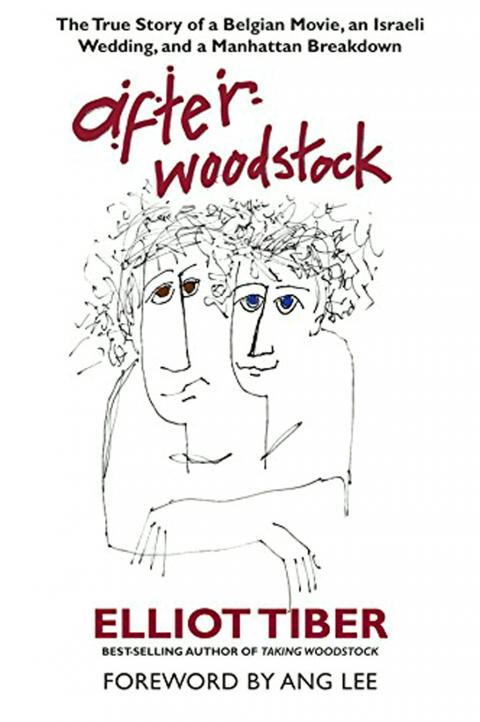In 2009, Taiwan-born Hollywood director Ang Lee (李安) made Taking Woodstock, a movie about American hippies in the 1960s and the Woodstock music festival in the summer of 1969. The film’s screenplay was written by longtime Lee collaborator James Schamus, adapted from a memoir by Elliot Tiber.
While the book was about a young gay Jewish man in his twenties who helped pull off the concert, Lee’s movie took some liberties with the story but nevertheless turned out a well-received film about those heady days.
Tiber has now written After Woodstock, a sequel that covers his adult life since the big concert up to the present day. And at the request of the publisher, Lee was kind enough to pen a 500-word foreword to the new book.

Photo Courtesy of square one publishers
Lee writes that his collaboration with Tiber came about after a chance encounter in a San Francisco television studio.
“I had just finished promoting my Chinese-language film Lust, Caution. On my way out [of the studio], I bumped into [the show’s] next guest... Elliot Tiber, then a very vigorous seventy-something, who cornered me and thrust a copy of his new book into my hands.”
“I am rather shy, and Elliot is a nonstop talker, and an extremely funny one, so I had no choice but to mumble something polite and take the book on my way to the airport,” Lee writes.
“Taking Woodstock came at exactly the right moment. It was full of light, love and laughs, a memoir about the last days of American innocence. And strangely enough, it also fit in with the movie I had just made: both were coming-of-age stories, a genre that I have continued to explore with Life of Pi and my current film project [Billy Flynn’s Long Halftime Walk].”
Could Elliot’s second memoir find an audience in translation with Taiwanese readers? Anthony Pomes, the New York publisher’s marketing director, said foreign rights are being shopped around worldwide and Taipei publishers are being queried, too.
“The book covers about 30 years of Elliot’s life, from 1969 to 1999, and with an epilogue that takes readers to present day,” Pomes said.
“A translation for Taipei is possible, and the foreword by Ang Lee might be a selling point in Taiwan. We shall see.”

May 18 to May 24 Pastor Yang Hsu’s (楊煦) congregation was shocked upon seeing the land he chose to build his orphanage. It was surrounded by mountains on three sides, and the only way to access it was to cross a river by foot. The soil was poor due to runoff, and large rocks strewn across the plot prevented much from growing. In addition, there was no running water or electricity. But it was all Yang could afford. He and his Indigenous Atayal wife Lin Feng-ying (林鳳英) had already been caring for 24 orphans in their home, and they were in

On May 2, Chinese Nationalist Party (KMT) Chairman Eric Chu (朱立倫), at a meeting in support of Taipei city councilors at party headquarters, compared President William Lai (賴清德) to Hitler. Chu claimed that unlike any other democracy worldwide in history, no other leader was rooting out opposing parties like Lai and the Democratic Progressive Party (DPP). That his statements are wildly inaccurate was not the point. It was a rallying cry, not a history lesson. This was intentional to provoke the international diplomatic community into a response, which was promptly provided. Both the German and Israeli offices issued statements on Facebook

Even by the standards of Ukraine’s International Legion, which comprises volunteers from over 55 countries, Han has an unusual backstory. Born in Taichung, he grew up in Costa Rica — then one of Taiwan’s diplomatic allies — where a relative worked for the embassy. After attending an American international high school in San Jose, Costa Rica’s capital, Han — who prefers to use only his given name for OPSEC (operations security) reasons — moved to the US in his teens. He attended Penn State University before returning to Taiwan to work in the semiconductor industry in Kaohsiung, where he

Australia’s ABC last week published a piece on the recall campaign. The article emphasized the divisions in Taiwanese society and blamed the recall for worsening them. It quotes a supporter of the Taiwan People’s Party (TPP) as saying “I’m 43 years old, born and raised here, and I’ve never seen the country this divided in my entire life.” Apparently, as an adult, she slept through the post-election violence in 2000 and 2004 by the Chinese Nationalist Party (KMT), the veiled coup threats by the military when Chen Shui-bian (陳水扁) became president, the 2006 Red Shirt protests against him ginned up by